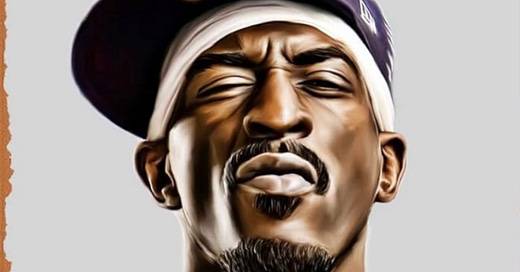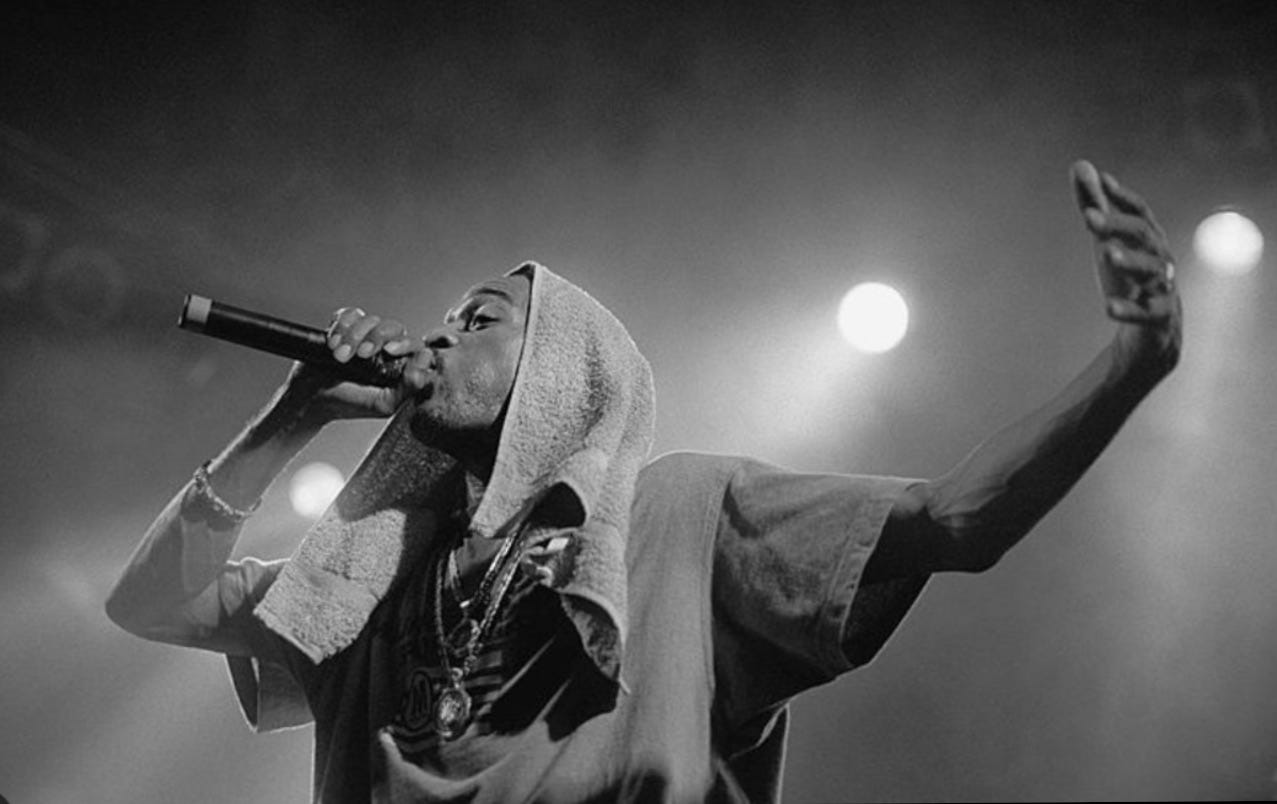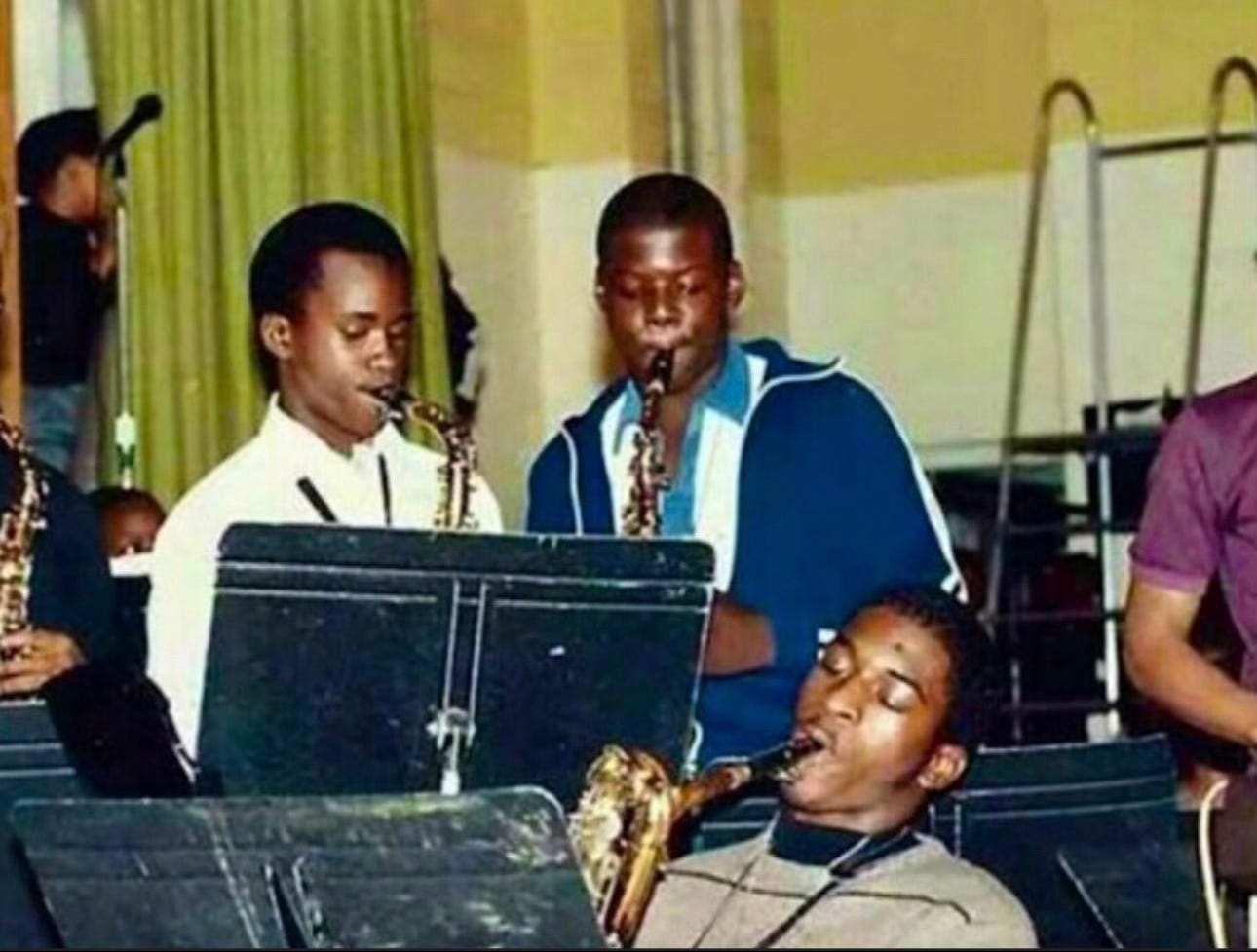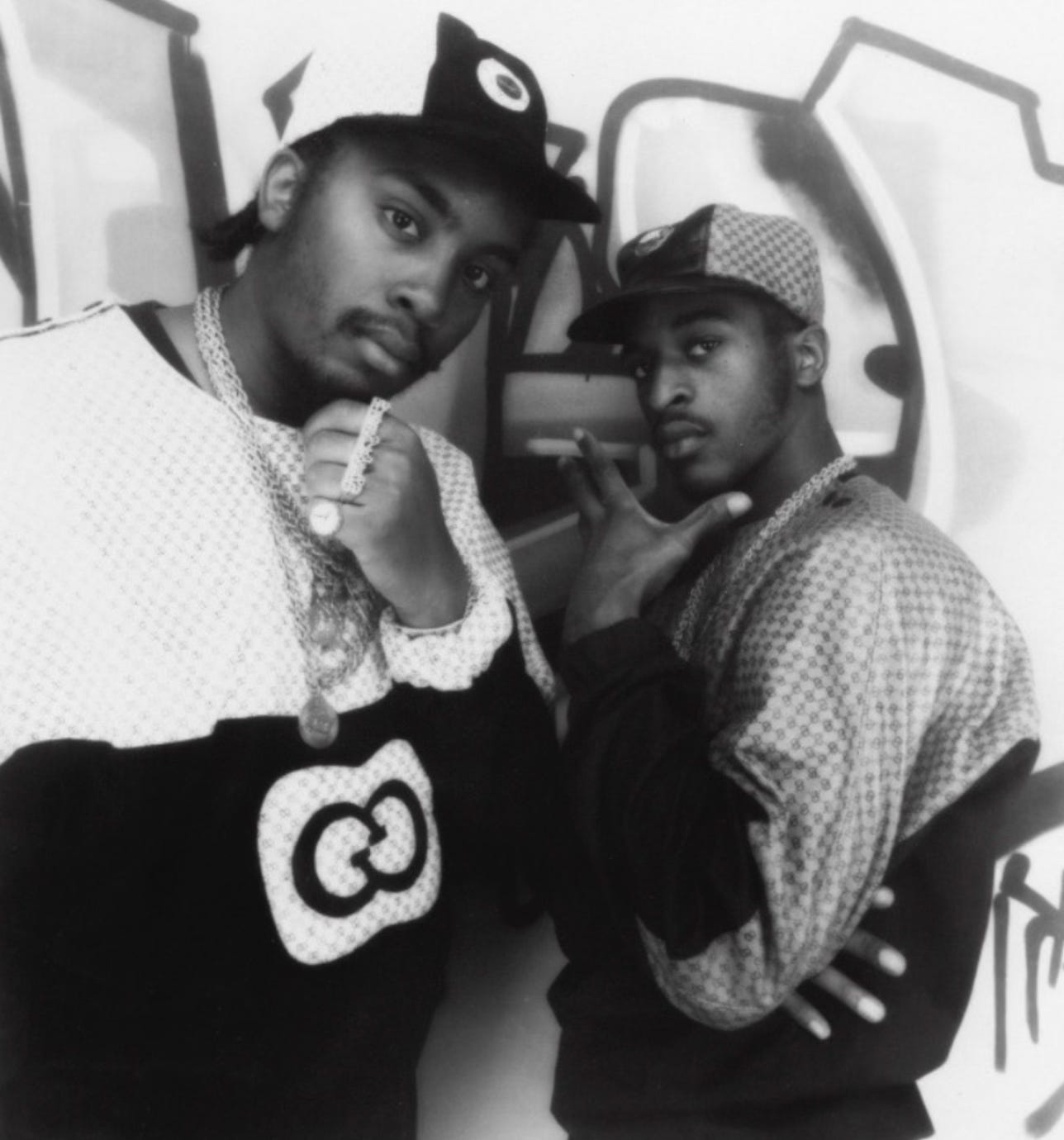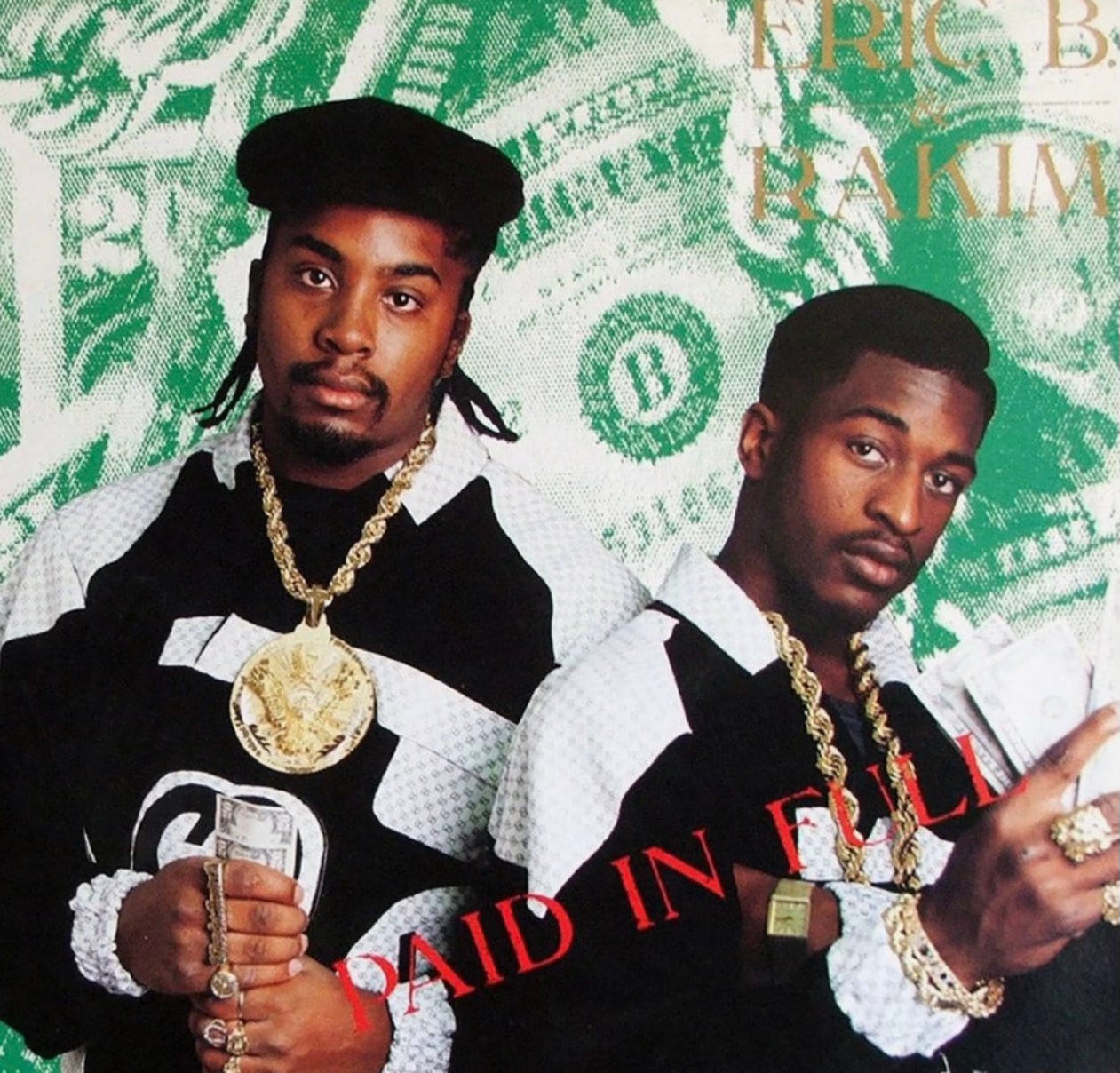The Father of All Modern MCs Is Rakim
All because he was trying to rap the way John Coltrane played
Today’s hiphop is giving you complex multisyllabic rhymes and wicked flows but once upon a time rap, as it was called back in the 80s, in the early days, was about monosyllabic rhymes and rhyming only on the 4 or at the end of the line. In 1984 Run-DMC’s iconic hit “Rock Box” started like this:
“For all you sucker MC's perpetratin a fraud
Your rhymes are cold wack and keep the crowd cold lost
You're the kind of guy that girl ignored
I'm drivin Caddy, you fixin a Ford
My name is Joseph Simmons but my middle name's Lord
And when I'm rockin' on the mic, you should all applaud.”
At the time this felt complex and innovative but now we understand that as a simpler era lyrically. What is the bridge between the old school and the now? Who is the MC who opened our eyes to the greater rhythmic possibilities of MCing? Who showed us the melodic possibilities of flow and new ways of approaching the page and showed us that hiphop lyrics could be deeply philosophical? Who is the hiphop father of all the best MCs—Nas, Jay, Kendrick, Biggie, Doom, Black Thought, 3K, Wayne, all of them? The answer is Rakim. Rakim is the one who turned the page. Rakim is the father of the modern style. Rakim is your favorite MC’s favorite MC.
When I think of Rakim’s place in hiphop history I think of this image:
He’s the triangle through which light is refracted, and if the light is the history of hiphop, then you see how before and after Rakim everything is different. How after his arrival it becomes more complex, more colorful, more three-dimensional.
In 1985, LL Cool J’s first verse on his epic first single on his first album, “My Radio” went like this:
“My radio, believe me, I like it loud
I'm the man with the box that can rock the crowd
Walkin down the street, to the hardcore beat
While my JVC vibrates the concrete
I'm sorry, if you can't understand
But I need a radio inside my hand.”
That rocked my world in ‘85. That was amazing back then. But now I’m like ok it’s mostly rhyming on the four. It’s mostly one syllable rhymes. And yes it’s emotionally direct and representative of the heart of the b-boys and rap fans of the time but it’s also a pretty simple statement. I love my boombox and it defines me. That’s an important statement. And simple can make for a great song. As I said, I loved this song in ‘85 and I felt like it represented me even though I was living in the suburbs of Boston. I still love “My Radio” But just one year later, in 1986, the first verse of the first single from Rakim’s first album, “Eric B Is President” sounded like this:
“I came in the door, I said it before
I never let the mic magnetize me no more
But it’s biting me, fighting me, inviting me to rhyme
I can’t hold it back, I’m looking for the line
Taking off my coat, clearing my throat
The rhyme will be kickin until I hit my last note
My mind remains refined, all kind of ideas
Self-esteem makes it seem like a thought took years to build.”
It’s brimming with internal rhymes. The rhyme pattern keeps changing in interesting ways. There’s polysyllabic rhymes. There’s multi-word rhymes. There’s at least one double entendre—“line” refers to both a line (a lyric) in his mind and the line or queue where people are lining up to get their turn on the mic. Overall, there’s a much more interesting relationship with rhythm in this verse. And it’s all about his internal feelings about being a rapper. He’s talking about the process of preparing to rhyme and telling us what he’s thinking and feeling about the rhymes he’s going to kick. It’s meta—it’s a rhyme about rhyming. And it takes you inside his self-confidence, his intelligence, his unabashed intellectualism, it’s almost avant-garde this discussion of how he thinks and feels about the thing he’s doing as a way of showing how good he is at it. This is a quantum leap forward from what LL did. I’m not picking on LL, I love him, I love that song. But Rakim was a quantum leap forward from everyone at the time because Rakim gave us a far more complex version of MCing. Listening to him after Run-DMC and LL is like watching the art form go into hyperdrive. Rakim is the beginning of the modern era. There are MCs who have had better overall careers but there is no single figure who has had as much influence on MCing as Rakim because he takes us from the more basic level of MCing to a much more complex level. He made multiple significant innovations. We’ll run through them. But first you gotta understand how he got there.
William Griffin was born in 1968 in Wyandanch, Long Island, the fifth and youngest child in a musical family. His mother trained as an opera singer in her youth and once sang at the Apollo. He had sisters who sang and brothers who played piano and saxophone, so the house was constantly filled with music from his mother playing records or singing or his siblings playing or singing. The famous 1950s singer Ruth Brown was his mother’s friend, so close that Rakim called her Aunt.
Here he is in 2018 talking about the influence of his beloved mother and his family.
When Rakim was a kid they called him Pop. Jazz was playing all the time in his childhood home, Miles Davis, Ella Fitzgerald, Cannonball Adderly, Sarah Vaughn. He wrote his first rhyme when he was five years old. By first grade he was analyzing songs he loved, writing down their lyrics, and trying to figure out what made them work. By second grade he could grab his brother’s sax and play anything he’d heard his brother play. He used to wait until his brother went out and then he grabbed his sax and played it. One day he was playing his brother’s sax when the reed broke. Pop was afraid that his brother would kill him and for sure when he got home and saw his reed broken, he flipped out. He knew Pop had done it. He was yelling at his little brother when mom came running in. She said, that was you playing Pop? That was really good. His brother said what? He replaced the reed and gave the sax to Pop. The 2nd grader played it just like his brother had. A year later they got him his own saxophone. The family was always encouraging him musically. And he was constantly listening to John Coltrane and trying to understand what he was doing on his horn. Pop became obsessed with Coltrane’s “My Favorite Things.” He listened to it over and over and then grabbed his sax and tried to do what Coltrane did. He didn’t know it then, but he was learning about flow. The way Coltrane manipulated time and space would inform Rakim’s approach to flow. Years later, when he got heavy into MCing, he tried to flow the way Coltrane played.
In the very early 80s, Pop was also watching rap culture grow up all around him. It wasn’t a phenomenon yet, it was something bubbling up in the hoods of New York. It was underground. You kinda had to know where to find it. Pop knew. He was devouring tapes of the Cold Crush Brothers and the Fantastic Five. He was b-boying with his friends and doing graffiti on canvases or walls and freestyling rhymes with friends. From an early age he was a good DJ. He thought a lot about being a DJ because DJs appeared to be the life of the party, but deep down, he really wanted to rhyme. In middle school when he started taking writing rhymes more seriously, he looked at three rappers as the highest standard: Melle Mel, Grandmaster Caz and Kool Moe Dee. He learned how to rhyme listening to them. But this was a time when rap was mostly taking place at night in public parks at parties where DJ’s plugged their equipment into street lamps to get power. This was a time when DJs spun and a variety of rappers came up and rapped. Almost anyone could get on the mic and say some rhymes, but not exactly anyone anyone. You generally had to have some sense of respect within the community. The DJ had to ok you for some reason. Pop was at a lot of those parties even though he was often the youngest one out that late at night. His parents were cool with it. Still, he was short as an early teenager so when he asked DJs if he could get on the mic, a lot of them said no. Once he asked a DJ if he could get on and the DJ said “Yo, man, you’re too small.” Another DJ said “Who’s little brother is this?” Once after a DJ dissed him, he got mad. A few moments later at the party a fight broke out. That distracted everyone so that’s when he kicked a hole in the speaker. It was like he was kicking everyone who had ever said no to him. He destroyed the speaker and ran off. He would later talk about that moment in “Microphone Fiend” when he said “Cool, cuz I don’t get upset, I kick a hole in the speaker, pull the plug then I jet.”
In his early teens Pop took on the MC name Kid Wizard because it made him sound like a young genius and it gave him something to live up to. If you call yourself Wizard, you better say some fly ish when you get on the mic. But a few years later, when he was 16, he grew impressed with the Muslin brothers he saw around him in the community and he started studying the lessons. At that point Kid Wizard no longer fit him so he renamed himself Wise Intelligence. Another name that demanded he be great. Around then his beloved older brother, the one who played sax, the one he shared a room with for years, he was also getting into Islam and he renamed himself Hakim. That led to Wise Intelligence renaming himself Rakim.
As time went on Rakim got taller and more known in the community and started to be able to get on the mic at the parties in the park whenever he wanted. Once he knew he’d be able to get on, he wrote differently. He started writing with the mindset of someone who knew he was going to be rhyming for people. Like he could visualize his audience. He wrote knowing he would be in the park and trying to get people hype. He was thinking, How can I get people excited? Or… how can I move the crowd? He was writing about that idea. He also began thinking a lot before writing and out of that he thought, I should tell people how much I’m thinking about my rhyming. So he started rhyming about his thought process. He was growing into himself. He says a critical moment on the road to becoming Rakim happened when he was just four years old. But we’ll get to that.
So around then he started going to his brother’s friend’s house to record rhymes and make tapes. Not songs, just 15 minutes of straight rhyming with no hooks, no choruses, just showing off lyrically. He wasn’t thinking about becoming a professional MC. The dream was to make a tape and get someone in the park with a big boombox to play it and have everyone around like it. The reality was that every tape he made he had to bring home and play for his sisters and his brothers and his parents. They were all super supportive. They cared about his music before there was much to care about and he felt lifted by that. He was so grateful for his family’s support. He couldn’t have made it without their support so he felt like he owed them something. He felt like he owed it to them to be honorable on his records. Plus, as I said, he knew they were going to listen to them. All of them. Like every time he walked in the house someone would say hey, did you record anything new? And if he had, he had to play it for everyone right away. So because of all of that he felt like he shouldn’t curse in his rhymes.
By 16 he was rhyming every day, all day. Rap was all he cared about. Except for football. He cared even more about football. He was a quarterback in high school who was hoping to play in college so he was working out all the time. But when he wasn’t running or lifting or throwing, he was writing and rhyming. He wasn’t in the streets but he did carry a gun sometimes but if he skipped school, which he did more than a little, it was to go to someone’s basement and record. He thought that being from Long Island was a disadvantage, who cares about Long Island, all the big name rappers are from the city, but he knew he had an advantage over everyone in rap. He understood music on a deeper level than anyone else who was writing rhymes then and he used that knowledge of rhythm and melody based on his years long study of saxophone and Coltrane to deepen his rhyming and his flowing.
But he still couldn’t imagine a career in MCing. No one had a career back then. It was still an underground culture with limited opportunities to get records played and to tour. No one was really making money so when he was a senior in high school he was focused on football and gearing up to play QB at Stonybrook College the following year. The coach said it was possible he could start as a freshman. He planned to get on the Stonybrook campus and focus on football so he went to his friend Maniac’s house, picked a beat and rhymed over it for 60 minutes. Both sides of a cassette tape. He wanted something he could take to college to let everyone know who was the best MC on campus. He wasn’t going to be battling everyone there. He was just gonna play the tape and keep it moving so he could focus on football. But sometimes when you make plans, life has a way of laughing at you.
So around that time a DJ named Eric B was putting together an album where a group of MCs rhymed over his beats. He was on the hunt for young MCs. He went to Wyandanch looking for one specific MC, didn’t find him, it was suggested that he check out this other MC who was a senior in high school. Eric went to Rakim’s house. Rakim played him the tape he’d made for Stonybrook. After five minutes Eric had forgotten all about the compilation album. He wanted to record an album with Rakim. Eric said, hey we can go record at Marley Marl’s place right now. But even with Eric promising to take him to see the hottest producer in the game, Rakim still thought of himself as a football player. He said, sure we can go make some records but I can’t sign a contract because then I’ll be ineligible to play college football. That’s why it ended up being Eric B and Rakim because at first they were making music as if it was Eric’s record with special guest Rakim so the kid wouldn’t mess up his NCAA eligibility. Because even though he was on the lip of hiphop fame, and had more talent than any famous rapper, he was still focused on playing college football.
Three weeks after that Rakim went to Marley’s house to make a record. He took the train. Rakim was thrilled, he knew Marley’s reputation. He was the biggest producer in rap. He was the architect of the sound of rap at that time. The studio was in the living room of his house. So Marley made the beat for “My Melody” and Rakim took his favorite lines from the Stonybrook tape and made them into a song. He’d been sitting on the couch while Marley worked on the beat so when Marley handed him the mic, he continued to sit on the couch as he started laying down the verse. He rhymed while chilling on the couch. After he finished Marley said, “Yo, that was dope! Let's do it again with a little more energy.”
Now, in his early days, Rakim wasn’t laid back—he rhymed with a lot of energy because that’s how most rappers were. But over time he decided he wanted to stay calm while he rhymed. He knew that made him sound like no one else and he loved that. So when Marley asked him to do it with more energy he was tapping into a discussion that Rakim had been having with himself for a while. He knew the sort of MC he wanted to be and he wasn’t going to let Marley change him. So he went back to the top and laid the verse down again in the same, calm way. Back then Run-DMC and LL Cool J were hot like fish grease and they basically shouted their rhymes. Rakim wanted his voice to be more low-key so he could be more thought-provoking. Marley was not used to that. The second time Rakim was doing the verse Marley stopped him mid-rhyme. He said, “I like the lines but try to put more energy in it.” The third and fourth and fifth take, same thing. After the sixth take Marley said, “Maybe if you stand up, it’ll be a little more energy.” Rakim was frustrated. He said, “I could stand, I could sit, it don’t matter, it’s still gonna sound the same.”
A little while later, MC Shan showed up. He was then one of the hottest MCs in hiphop then. He and Marley disappeared into the kitchen and huddled for a minute. Rakim was a big fan of Shan’s music but even though he was an amateur at his first real session, he wasn’t going to let Shan tell him how to MC.
Shan came into the living room and said, “Yo, Marley had to step out for a minute, he went to the store, so I'm going to produce the session.” They started recording again and right away Shan said, “Yo Lord, why don't you put a little more energy in it?” Rakim said, “This is the way I roll, man.”
He finished the song. Shan was like, ‘Great rhymes but you’re gonna put people to sleep.’ Still, he went home with another beat from Marley to rhyme on. This time as he sat in his parents basement trying to figure out what to say, he thought, this is the first time that I’m writing something that I know a lot of people are going to hear. He knew that thousands of people could hear this record so he thought, ok let’s make an introduction record, something that tells people who I am. He wrote, “I came in the door, I said it before, I’ll never let the mic magnetize me no more.” He was introducing himself to the world. He loved the experience of writing while knowing that he would be heard and after that day he changed his mindset—he went from thinking of himself as primarily a football player to primarily an MC. Where he had been doing pushups and running all the time to prepare for football, now he was writing rhymes all the time. He knew 100 ways to help himself get better at football but he didn’t yet know 100 ways to help himself be a better MC but he challenged himself to start finding those ways. He started doing more reading and more research and studying all sorts of music. This is when he really starts to become himself. He never made it to Stonybrook. Halfway through his senior year in high school his first single blew up and he had to go on tour. He never finished high school, he never set foot on a college campus as a student. Once he went on his first tour his life became all about studios and stages, which led to him thinking ok I’m the best MC out here. How can I extend my lead? How can I do things differently?
He started looking for different ways to write. He was like, ok, I know I can write left to right but are there other ways to approach the page? What impact does the way you write have on the end product? He said, what if I could also write down the paper instead of just across? He drew lines on the paper. Three lines going down creating a grid with four areas. Instead of just rhyming at the end of the phrase, on the 4, he tried to see how many rhymes he could fit into the grid going down the paper. Could he make it so that the words in the second cell rhymed all the way down the page the same way that the words in the fourth cell rhymed all the way down the page. When he started looking for new ways to write, he was able to innovate. That’s how he got into internal rhymes. He also started putting dots on the page to represent time which led to him plotting out where he would pause to take a breath so it would add a bit of syncopation so the pause could be part of the rhyme because his study of jazz let him know that the spaces in between the words are just as important as the words. That gave depth to his flow. He was using the pauses as part of the rhyme.
This helps us understand some of Rakim’s innovations. Before him, we saw very occasional usage of internal rhymes. Rakim made internal rhymes a normal thing in a great verse. By internal rhymes I mean rhymes that aren’t on the 4, that aren’t at the end of the line, but arrive in the middle of the line. Rakim also gives us polysyllabic rhymes, as in rhyming multi-syllable words or groups of words. He gives us assonance rhymes so instead of finishing his thought with a rhyming word, or finishing his thought at the end of the line, he’s continuing his thought past the end of the line so the listener is pulled through his rhyme in a wholly different way. He also gave us far more philosophical rhymes than we’d ever seen. He’d talk about his internal thoughts about MCing and sinking into the page and flying into outer space. And he did all of this with an approach to rhythm and flow that was complex. He kept changing his rhyme pattern, yet it was always on time and smooth, and now that we know it came from his love of Coltrane and jazz and the saxophone. To say nothing of him doing all of this in this amazing voice, this deep, resonant, hyper-serious sounding voice that made everything he said sound incredible.
One last thing that made Rakim who he was as an MC happened when he was just four years old. He was walking through the house, about to go outside, when he saw his mom and his aunt in the kitchen having a heated talk. His mom said to his aunt, “I don’t know what the fuck happened.” Conflict! Drama! He slowed down and acted like he was getting some water, but he was ear hustling their conversation. Then his mom said something that made him feel like the whole world had stopped. He couldn't even hear the water comin out of the faucet after he said this. His mom said to his aunt, “Who the fuck are you that I gotta lie to you?” Right there his mom let him know that nobody is so important that you have to lie to them. He realized you only lie to people when you’re afraid of them and if you’re not afraid of anyone, then you have no reason to lie. He did not fully realize all of this at the time, but later he saw that that moment had a massive impact on his life. Her words that day stuck with him forever and became a part of the way he rhymes. There was no need to brag or boast or exaggerate. He was not coming to impress you with anything that wasn’t real. Who are you that he would need to lie to you? He always wanted to be an honest storyteller. And that’s what Rakim became.

